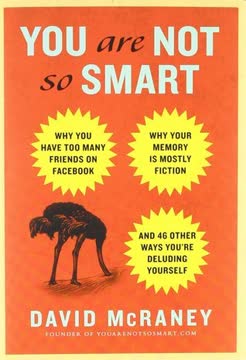Key Takeaways
1. Common sense is not always reliable for understanding complex social phenomena
The paradox of common sense, therefore, is that even as it helps us make sense of the world, it can actively undermine our ability to understand it.
Limitations of intuition. Common sense, while useful for navigating everyday situations, often fails when applied to complex social phenomena. It tends to oversimplify cause-and-effect relationships and ignore important contextual factors. This can lead to misunderstandings and flawed decision-making in areas like economics, politics, and social policy.
Circular reasoning. Common sense explanations often suffer from circular logic, describing what happened rather than explaining why. For example, saying a book became popular "because people liked it" doesn't actually explain the underlying factors that led to its success. This tendency can prevent us from gaining deeper insights into social processes.
Need for systematic inquiry. To truly understand complex social phenomena, we need to move beyond common sense and employ more rigorous methods of inquiry. This includes:
- Collecting and analyzing empirical data
- Developing and testing hypotheses
- Considering alternative explanations
- Acknowledging the limitations of our knowledge
2. Individual behavior is influenced by unconscious factors and biases
Thinking of future events in terms of probabilities is difficult enough for even coin tossing or weather forecasting, where more or less the same kind of thing is happening over and over again. But for events that happen only once in a lifetime, like the outbreak of a war, the election of a president, or even which college you get accepted to, the distinction becomes almost impossible to grasp.
Unconscious influences. Our behavior is shaped by many factors operating outside our conscious awareness. These include:
- Priming effects (exposure to certain stimuli affecting subsequent behavior)
- Anchoring (relying too heavily on initial information)
- Framing (how information is presented affecting decisions)
- Availability bias (overestimating the likelihood of events we can easily recall)
Limits of rationality. While we like to think of ourselves as rational actors, our decisions are often based on incomplete information, emotional responses, and mental shortcuts (heuristics). This can lead to systematic errors in judgment and decision-making.
Implications for social science. Understanding these unconscious influences is crucial for developing more accurate models of human behavior. It challenges simplistic notions of rational choice and highlights the need for more nuanced approaches to studying social phenomena.
3. Collective behavior emerges from complex interactions, not just individual actions
Just as you can know everything about the behavior of individual neurons and still be mystified by the emergence of consciousness in the human brain, so too you could know everything about individuals in a given population—their likes, dislikes, experiences, attitudes, beliefs, hopes, and dreams—and still not be able to predict much about their collective behavior.
Emergent phenomena. Collective behavior often exhibits properties that cannot be predicted or explained solely by looking at individual actions. This is known as emergence. Examples include:
- Financial market bubbles and crashes
- Viral trends and memes
- Social movements and revolutions
Network effects. The structure of social networks plays a crucial role in shaping collective behavior. Small changes in network structure or initial conditions can lead to dramatically different outcomes.
Limitations of reductionism. Trying to understand collective behavior by focusing solely on individual psychology or motivations is often inadequate. We need to consider:
- Feedback loops and reinforcing mechanisms
- Threshold effects and tipping points
- The role of social influence and information cascades
4. Historical explanations often suffer from hindsight bias and oversimplification
Commonsense reasoning, therefore, does not suffer from a single overriding limitation but rather from a combination of limitations, all of which reinforce and even disguise one another.
Hindsight bias. When looking back at historical events, we tend to see them as more predictable and inevitable than they actually were. This leads to oversimplified narratives that ignore the complexity and contingency of real-world events.
Narrative fallacy. We have a strong tendency to construct coherent stories to explain past events, even when those explanations may not be accurate. This can lead to:
- Overemphasis on the role of individuals ("great man" theories of history)
- Neglecting alternative explanations or counterfactuals
- Underestimating the role of chance and randomness
Importance of context. To better understand historical events, we need to:
- Consider multiple perspectives and interpretations
- Examine the broader social, economic, and cultural context
- Acknowledge the limits of our knowledge and the role of uncertainty
5. Predicting specific outcomes in complex systems is inherently difficult
In complex systems, tiny disturbances in one part of the system can get amplified to produce large effects somewhere else—the "butterfly effect" from chaos theory that came up in the earlier discussion of cumulative advantage and unpredictability.
Limitations of prediction. In complex social systems, precise prediction of specific outcomes is often impossible due to:
- Sensitivity to initial conditions (small changes can lead to large effects)
- Non-linear interactions between components
- Feedback loops and emergent properties
Probabilistic thinking. Instead of trying to predict exact outcomes, we should focus on:
- Identifying ranges of possible outcomes
- Estimating probabilities of different scenarios
- Understanding the factors that influence system behavior
Implications for planning. Given the inherent unpredictability of complex systems, strategies should focus on:
- Building robustness and adaptability
- Developing contingency plans for multiple scenarios
- Continuously monitoring and adjusting based on new information
6. Measure-and-react strategies are often more effective than trying to predict the future
Rather than attempting to anticipate correctly what will work in the future, that is, they should instead improve their ability to learn about what is working right now.
Limitations of long-term planning. In rapidly changing environments, long-term predictions and rigid plans often fail. Instead, organizations can benefit from:
- Rapid experimentation and prototyping
- Continuous feedback and iteration
- Flexibility to adapt to changing circumstances
Data-driven decision making. Advances in technology and data collection allow for more sophisticated measure-and-react strategies:
- A/B testing and controlled experiments
- Real-time monitoring of key metrics
- Machine learning and predictive analytics
Examples of success. Companies like Amazon, Google, and Facebook have achieved success through measure-and-react approaches:
- Constantly testing and optimizing user interfaces
- Personalizing content and recommendations based on user behavior
- Rapidly iterating on products and features
7. Social science can provide insights beyond common sense through systematic study
Social science has still not found its Kepler. But three hundred years after Alexander Pope argued that the proper study of mankind should lie not in the heavens but in ourselves, we have finally found our telescope.
Value of scientific approach. While social science may not produce laws as precise as those in physics, it can still provide valuable insights through:
- Rigorous data collection and analysis
- Development and testing of theories
- Identification of patterns and regularities in social behavior
Challenging assumptions. Social science research often reveals counterintuitive findings that challenge common sense beliefs. This can lead to:
- More effective policies and interventions
- Better understanding of social problems
- Improved decision-making in organizations and governments
Emerging tools and methods. Advances in technology and data science are opening up new possibilities for social research:
- Large-scale online experiments
- Analysis of social media and digital trace data
- Computational modeling of social systems
8. Success is often determined by chance and cumulative advantage, not just merit
Even when we find ourselves describing someone's ability in terms of societal measures of success—prizes, wealth, fancy titles—rather than in terms of what they are capable of doing, we ought to worry that we are deceiving ourselves.
Role of chance. Initial success or failure in many domains is heavily influenced by random factors and luck. This includes:
- Being in the right place at the right time
- Benefiting from unexpected opportunities or connections
- Avoiding unforeseen setbacks or obstacles
Matthew Effect. Success tends to breed further success through mechanisms of cumulative advantage:
- Increased visibility and recognition
- Access to better resources and opportunities
- Positive feedback loops reinforcing initial advantages
Implications for fairness. Recognizing the role of chance and cumulative advantage challenges meritocratic notions of success and raises important questions about:
- How we allocate opportunities and resources in society
- The design of fair and equitable systems
- The need for interventions to level the playing field
9. Incentives and performance have a complicated relationship
Just as with the high modernists before them, these "planners," as Easterly calls them, are well-meaning and intelligent people who are often passionately devoted to the task of helping the people of the developing world. Yet in spite of the trillions of dollars of aid that planners have devoted to economic development, there is shockingly little evidence that the recipients are better off for it.
Limitations of simple incentive models. The relationship between incentives and performance is often more complex than common sense suggests:
- Financial incentives can sometimes decrease intrinsic motivation
- Poorly designed incentives can lead to gaming the system or unintended consequences
- The effectiveness of incentives can vary greatly depending on context and individual differences
Multifaceted nature of motivation. Human motivation is influenced by a variety of factors beyond just financial rewards:
- Sense of purpose and meaning
- Autonomy and control over one's work
- Opportunities for growth and mastery
- Social recognition and status
Need for holistic approaches. To effectively improve performance, organizations should consider:
- Aligning incentives with broader goals and values
- Creating supportive environments that foster intrinsic motivation
- Using a mix of monetary and non-monetary incentives
- Regularly evaluating and adjusting incentive structures based on outcomes
10. Fairness and justice depend on societal context, not just individual actions
Ultimately, we will probably never have a science of sociology that will resemble physics. But that's OK. Just because physics has experienced such great success on the strength of a small number of very general laws doesn't mean that that's the only way for science to proceed.
Context-dependent nature of fairness. Notions of fairness and justice are not universal but are shaped by:
- Cultural norms and values
- Historical and social context
- Existing power structures and institutions
Limitations of individualistic approaches. Focusing solely on individual actions or choices can obscure broader systemic issues related to fairness and justice:
- Structural inequalities and discrimination
- Unequal distribution of opportunities and resources
- Intergenerational transmission of advantage and disadvantage
Need for systemic thinking. Addressing issues of fairness and justice requires considering:
- The role of institutions and social structures
- Collective responsibility and social solidarity
- Balancing individual rights with societal well-being
- Long-term consequences of policies and practices
Last updated:
FAQ
What's Everything Is Obvious: Once You Know the Answer about?
- Exploration of Common Sense: The book delves into the paradox of common sense, highlighting its utility in daily life but its limitations in complex social contexts.
- Critique of Predictive Abilities: Duncan Watts argues that common sense often leads to overconfidence in predicting human behavior and social phenomena, which are inherently unpredictable.
- Sociological Insights: The author uses sociological research to show how our intuitive understanding of social dynamics can be flawed, advocating for a scientific approach to social science.
- Predictive Models and Complexity: It also examines the limitations of predictive models and the unpredictability of complex systems like financial markets.
Why should I read Everything Is Obvious?
- Challenging Assumptions: The book encourages questioning assumptions about human behavior and the effectiveness of common sense in understanding social issues.
- Real-World Applications: Insights are applicable to fields like politics, business, and marketing, making it relevant for both professionals and general readers.
- Understanding Human Judgment: It provides insights into human judgment, particularly in decision-making and prediction, relevant for personal and professional contexts.
- Critical Thinking Skills: Promotes a more analytical approach to understanding social phenomena by questioning the reliability of intuitions.
What are the key takeaways of Everything Is Obvious?
- Limitations of Common Sense: Common sense is not always reliable for understanding complex social phenomena and can lead to systematic errors.
- Importance of Context: Social behavior is influenced by context and interactions, often overlooked in commonsense reasoning.
- Need for Scientific Approach: Advocates for a data-driven approach to social science, rather than relying solely on intuition and anecdotal evidence.
- Limitations of Prediction: Predictions are often unreliable, especially for complex events, and accuracy diminishes with longer time frames.
What are the best quotes from Everything Is Obvious and what do they mean?
- "When every answer and its opposite appears equally obvious...": Highlights the fallibility of common sense, suggesting that what seems obvious may not be true upon closer examination.
- "The paradox of common sense...": Emphasizes that while common sense helps make sense of the world, it can undermine understanding in complex scenarios.
- "Learning to think like a sociologist...": Encourages critical thinking and skepticism towards intuitive beliefs, advocating for an analytical approach to social dynamics.
- "The whole trick is to know what variables to look at...": Underscores the importance of identifying relevant factors in predictions, suggesting simple aggregation of diverse opinions can be effective.
How does Everything Is Obvious critique common sense reasoning?
- Systematic Errors: Common sense can lead to systematic errors in judgment, especially in complex social situations with multiple factors.
- Overconfidence in Predictions: People often overestimate their ability to predict social outcomes based on commonsense understanding, leading to poor decision-making.
- Need for Data-Driven Insights: Advocates for a shift towards data-driven approaches in social science to counteract the limitations of common sense reasoning.
What is the "micro-macro problem" discussed in Everything Is Obvious?
- Definition of Micro-Macro Problem: Refers to the challenge of explaining how individual actions aggregate to produce collective outcomes in social systems.
- Complex Interactions: Social phenomena cannot be fully understood by examining individual behavior alone; interactions between individuals are crucial.
- Implications for Social Science: Complicates the development of theories in sociology, requiring understanding of large group dynamics rather than just individual motivations.
What is the "wisdom of crowds" concept in Everything Is Obvious?
- Definition of Wisdom of Crowds: Suggests that collective decision-making can lead to better outcomes than individual decision-making, as diverse opinions can cancel out individual errors.
- Application in Prediction Markets: Discusses how prediction markets leverage the wisdom of crowds to generate more accurate forecasts by aggregating knowledge.
- Limitations: While powerful, it can lead to poor outcomes if the crowd is misinformed or lacks diversity.
How does Everything Is Obvious address the concept of "black swans"?
- Definition of Black Swans: Rare, unpredictable events with significant consequences, like political upheavals or financial crises.
- Challenges in Prediction: Predicting black swan events is difficult because they are often only identifiable in retrospect, complicating causality understanding.
- Implications for Planning: Suggests reliance on common sense can lead to underestimating black swan events, emphasizing the need for robust planning and risk assessment.
What is the strategy paradox discussed in Everything Is Obvious?
- Definition of Strategy Paradox: Organizations with clear strategies can still fail due to unforeseen circumstances, as seen in Sony's Betamax and MiniDisc failures.
- Role of Luck in Success: Even well-planned strategies can fail due to luck, with great strategy leading to both success and failure.
- Need for Scenario Planning: Organizations should engage in scenario planning to prepare for various potential futures, acknowledging prediction limits.
How does Everything Is Obvious explain the role of luck in success?
- Luck vs. Skill: Many successful outcomes are influenced by luck rather than skill, with good plans failing and bad plans succeeding by chance.
- Matthew Effect: Initial success can lead to further advantages, creating a cycle where "the rich get richer and the poor get poorer."
- Need for Objective Evaluation: Emphasizes evaluating talent and performance based on objective measures rather than outcomes, which can be misleading due to luck.
What is the significance of social networks in Everything Is Obvious?
- Influence of Social Networks: Social networks shape individual behavior and decision-making, with homophily suggesting "birds of a feather flock together."
- Role of Influentials: Discusses influentials—individuals with disproportionate impact on social circles—driving trends and behaviors.
- Implications for Marketing: Understanding social networks and influence dynamics can help businesses tailor marketing strategies effectively.
How does Everything Is Obvious suggest we improve our predictions?
- Averaging Opinions: Aggregating diverse opinions rather than relying on a single expert can yield better results.
- Tracking Performance: Keeping track of predictions and outcomes over time helps learn from past mistakes and improve forecasting.
- Embracing Uncertainty: Advocates for accepting uncertainty and developing flexible strategies that adapt to changing circumstances, rather than relying on rigid models.
Review Summary
Everything Is Obvious* challenges our reliance on common sense in understanding complex social phenomena. Watts argues that common sense often fails us when predicting outcomes in business, politics, and society. He explores how our cognitive biases lead to flawed reasoning and misinterpretation of events. The book emphasizes the need for rigorous social science research and data-driven approaches to decision-making. While some readers found the book repetitive, many praised its thought-provoking insights and its critique of simplistic explanations for social dynamics.
Similar Books










Download PDF
Download EPUB
.epub digital book format is ideal for reading ebooks on phones, tablets, and e-readers.





